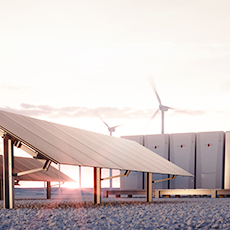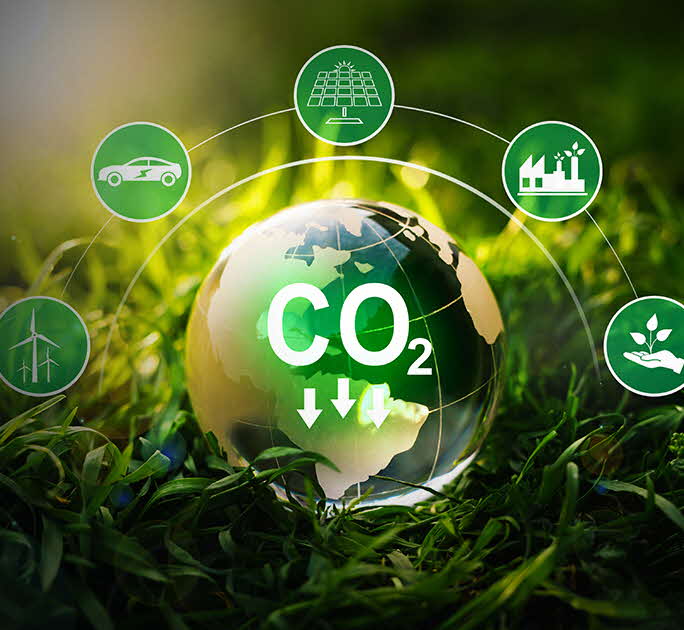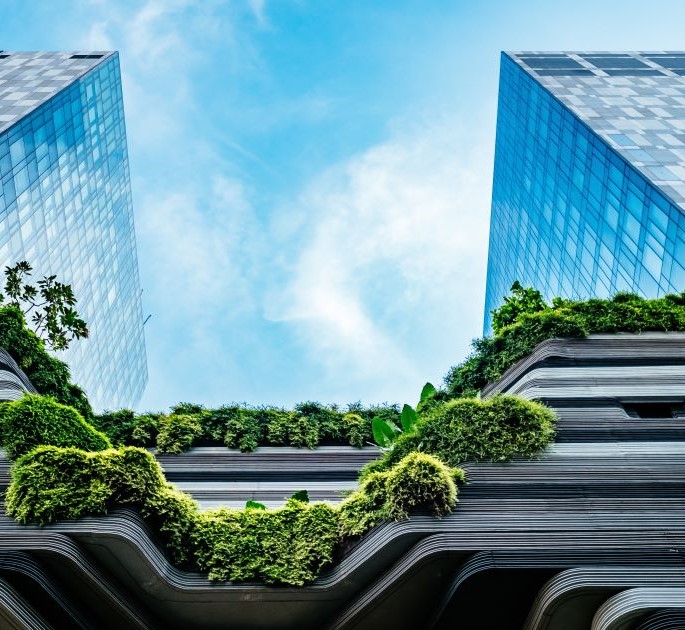Scaling Renewable Energy Infrastructure to Achieve Singapore Net-Zero Future

In Partnership with Bloomberg Media Studios
Singapore aims to achieve net-zero emissions as soon as possible in the second half of this century, yet the island nation lacks the natural renewable energy sources required to decarbonise.1
Nestled in the heart of Southeast Asia, Singapore is not endowed with natural resources such as large flowing rivers to draw hydro power and consistent wind power. And being a small island nation, it lacks sufficient land to make it economically productive for the deployment of large utility scale solar projects.
“These factors create a set of challenges that are unique to Singapore, as the city state pushes to increase its renewable energy mix as part of efforts to achieve a net zero economy,” says Kelvin Wong, Deputy Head of Energy, Renewables and Infrastructure, DBS. “Innovative sustainable solutions are key to achieving a net zero world. We need to start thinking outside the box from a technological and commercial point of view about how we can accelerate and fulfill our decarbonization commitments."
Floating Solar Photovoltaic Systems (PV) - An Innovative Approach to Solar
DBS takes its role in building a sustainable future seriously, and the bank has stepped up efforts on providing sustainable financing to transition the energy industry towards renewables in recent years.
One such project that DBS played a leading financing role on is the 60 megawatt-peak Sembcorp Tengeh Floating Solar Farm by leading Pan-Asian energy and urban solutions provider Sembcorp Industries.
Spanning more than 122,000 floating solar panels across a space equivalent to 45 football fields, Sembcorp Tengeh Floating Solar Farm is one of the world’s largest inland floating solar photovoltaic systems (PV) and will contribute to Singapore’s goal of quadrupling solar energy deployment by 2025.2
“Sembcorp Tengeh Floating Solar Farm is a monumental project for Singapore and Sembcorp that showcases how a small country can harness renewable energy despite limited land resources,” says Eugene Cheng, Group Financial Officer, Sembcorp Industries.
The solar farm will be sufficient to power Singapore’s five local water treatment plants, offsetting about 7% of PUB’s annual energy needs. This is equivalent to powering about 16,000 average Singaporean households and reducing carbon emissions by about 32 kilotonnes annually, the same as taking 7,000 cars off the roads.3, 4
“The project’s success showcases the viability of using suitable water catchment areas for utility-scale inland floating solar PV systems to help achieve Singapore’s climate emission targets,” says Cheng. “It also makes Singapore one of the few countries in the world to have a 100% green waterworks system.”
Acting as the sole financier, DBS provided Sembcorp with a SGD40 million loan facility in 2020 to fund the project.5 The deal reflects the bank’s commitment to accelerating decarbonisation across Southeast Asia.
“Enabling renewable energy financing is at the core of DBS’ agenda and is one of the key tenets of our sustainability strategy,” Wong says. "It builds on our recent financial advisory roles in Taiwan’s largest floating solar project to date and the market’s largest ground-mounted solar project then – which is an area we seek to differentiate ourselves in by capturing financial advisory opportunities at the start of renewables projects so we can shape and influence to achieve optimal outcomes early.”
Renewable Energy Financing Progress
Another tool in the global battle against climate change comes in the form of sustainable finance, which channels money into projects that take environmental, social and governance considerations into account.
In Southeast Asia, Singapore-based companies lead the way, outpacing their regional peers in terms of sustainable debt issuance.6 In 2021, sustainability-linked loans issued by companies like Trafigura, Olam International, Singapore Telecommunications, GLP Holdings and Sembcorp Industries accounted for over half of the sustainability-linked capital raised in Singapore.7
As a purpose-driven bank, DBS has been scaling positive ESG impact through sustainable finance, growing its sustainable finance portfolio to S$52.7 billion as at 30 June 2022, exceeding its S$50 billion target well ahead of 2024. DBS also recently announced one of the most comprehensive set of decarbonisation targets8 by a bank globally for several sectors, including Power, as part of its commitment to achieve net zero financed emissions by 2050.
“Green finance has been a positive force driving the development of renewable energy projects in Singapore and the region over the years,” Wong says. “What we need to focus more on however is transition finance to provide funding support to corporates in brown sectors, to become greener. This includes financing to accelerate the retirement of coal-powered plants and decarbonize hard-to-abate activities. Only through a multi-pronged approach, would we be able to move the needle towards the drive to net zero.”
DBS was also one of the lead banks and joint sustainability coordinators in a five-year S$1.2 billion syndicated sustainability-linked revolving credit facility to Sembcorp in May 2022—the first and largest Singapore Overnight Rate Average-based syndicated sustainability-linked loan facility for an energy company in Southeast Asia.9
“It was important to find the right banking partner who is invested in building a partnership with us and believes in our commitment to grow our sustainable solutions business,” Cheng says, noting the Sustainability-linked Loan Facility will be used for general corporate purposes and / or financing or refinancing of the Sembcorp’s renewable energy and other sustainable projects.10
“At Sembcorp, sustainability is our business,” Cheng adds. “Driven by our purpose to play our part to build a sustainable future, we have a responsibility to respond to climate change. The loan underpins our strategy to transform our portfolio from brown to green, which is driven by growing our sustainable solutions portfolio, comprising renewables and integrated urban solutions businesses.”
1. MOF
2. Sembcorp
3. Sembcorp
4. SIWW
5. DBS
6. BloombergNEF
7. BloombergNEF
8. Accelerating our net zero commitment (dbs.com.sg)
9. Sembcorp
10. Sembcorp



